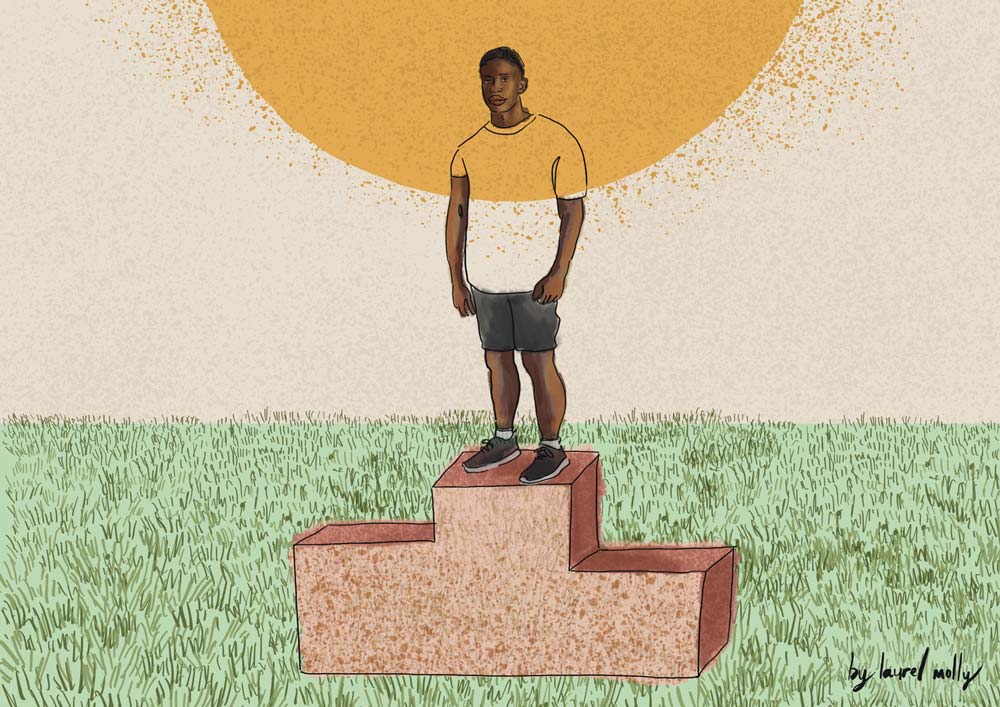Keep Body and Soul Together: Surviving the Asylum System

All illustrations by Laurel Molly. Find her on Instagram @laurel_molly.
“I am sad to inform you that your application has been denied” – Home Office.
Growing up, I did not get to experience typical childhood, teenage fears, and anxieties. Instead, I had thoughts such as “Do I have enough money to afford a 99p loaf of bread at Lidl?”, “Once I am 18, will I have to go to the police station every Wednesday to sign? What if I get detained? “Do I have the option to go to university after college and, if not, can I at least go travelling or even get a job?”
The constant thoughts that bugged me over year after gruelling year of going through the immigration process have been “What on earth am I going to do?”, “My sister is thirteen and it breaks my heart to think that she might become homeless”, “My brother has been detained for the third time, I am scared for his life, but I do hope he is well!”
Some of my most vivid memories of this time were not being able to afford broadband during my last year of GCSEs. I would go to the library after school and after closing hours, sit outside in the dark for hours with my laptop in the middle of the winter, so that I could revise, complete assignments, and maybe watch an episode or two of Friends. Another was moving into a shared 3 bedroomed house with my parents, younger sister and two complete strangers. Not only was it awkward to live and act freely, I had to explain our living situation to a friend who once stopped by and met an unrelated person in the front room. Sometimes the heaters would stop working, so we would stay in the kitchen and keep the oven door open to keep warm in the colder months.
All these are thankfully distant memories that I now reminisce and joke about. But not everyone comes out of the other side with settled status. Those of us who do often have to deal with the aftermath and the toll immigration process has taken on our mental health.
I think most people eventually learn to deal with the stress of the uncertainty of the asylum process. It is the often overwhelming, though subconscious, baggage that comes with that stress that persists – the little irrational thoughts and fears, the lack of trust that builds, the lack of self-confidence, the distorted self-image, broken relationships and families. Although, I have been lucky enough to come out of this process sane, most people are met with quite a different fate.
It’s not all sad stories though. I have met some of the most incredibly generous and kind people along the way – close friends that have been there for me and charities that have supported me and my family throughout. Now I work with Bristol Refugee Rights providing exercise classes for people seeking asylum and new refugees. Exercise, especially strength training, has been very helpful and therapeutic for me throughout the asylum hardship and it continues to be that way now.
I started exercising originally to get away from the stress, to change the way I looked and the way other people saw me. However, I ended up staying for the unexpected and invaluable lessons that l learned along the way.
I found that exercising – mainly strength training – was the only thing in my life that I had full control over. My progress was purely based on how much effort I had put in and I could decide to get stronger at my own pace. In a world where everything seemed uncertain, having this sense of certainty meant a lot to me. Now, I am a Strength Coach and alongside my work, I coordinate exercise classes for Bristol Refugee Rights, with the hope of sharing my love for strength training. This is so that members of BRR and my clients alike can develop their own interest, take control of and connect with their bodies.
I can also now afford that bread from Lidl.
Having been through the asylum system myself, I have great respect for anyone who comes here for a better life or is running away from persecution – as my family did.
I share my story with the hopes that anyone who reads this will look at refugees, asylum seekers and immigrants at large a little kinder, a little less judgemental, a little more patient and be a little more considerate.
By Tim.
Donate to our important work to empower people seeking asylum.
Read about Sireen’s experience coming to U.K. for the first time.
Read our member Mosi’s experience in the Penally Camp Army Barracks.